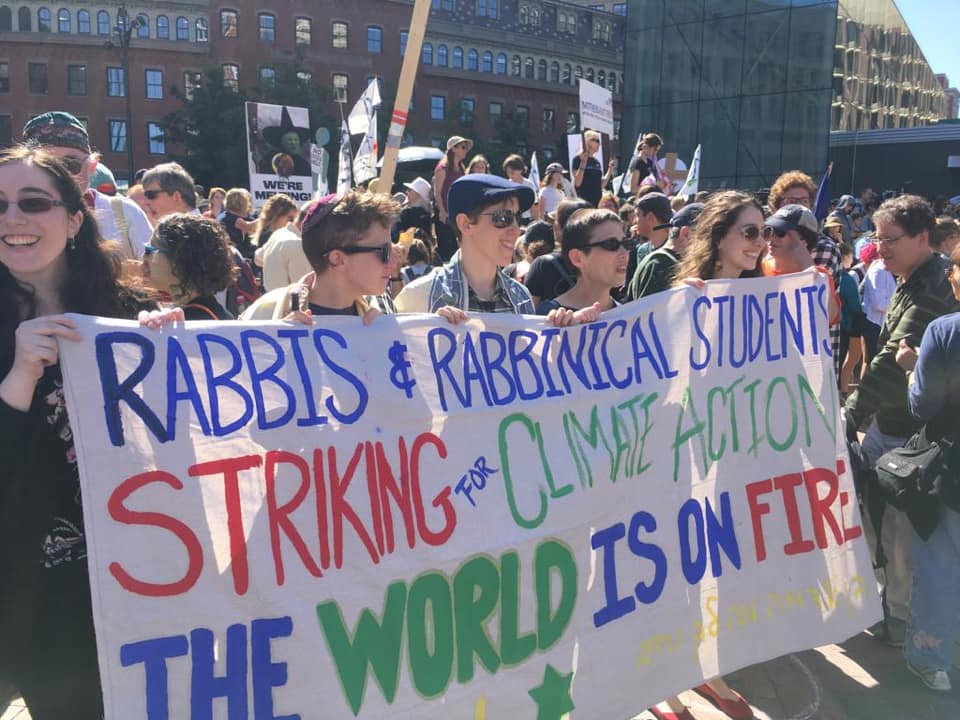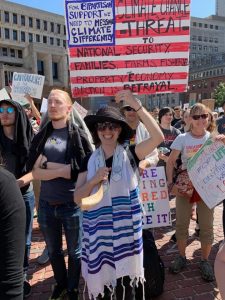Community Blog Feel the Tekiah: On Elul and the International Climate Strikes

There is something that happens when we hear a gifted ba’al tekiah (shofar blower) on Rosh Hashanah. We do not only hear the shofar with our ears, which is the mitzvah. We feel it, vibrating in our bones.
On Friday September 20, I joined over 30 members of the Hebrew College community in the streets of Boston for the most recent International Climate Strike. Earlier that morning, a group of students had gathered for morning prayers before heading over to the rally and march. We held a colorful painted banner, designed by students, that read “Rabbis and Rabbinical Students Striking for Climate Action! The World is on Fire! Wake up!” Many of us wore tallitot, carried handmade signs, and brought our own shofars. And it should be noted that Hebrew College’s support of the strike went further than students. Faculty rescheduled classes. Selichot were cancelled for the morning. There was a general understanding of the need to disrupt our normal routines in honor of the great disruption happening around us.
As the Strike’s speakers inspired tears and cheers, our shofars sounded: Tekiah! Sh’varim! Teruah! Lifting our chins to blow loudly into the crowd, we could see Boston City Hall which has not yet declared a Climate Emergency, and beyond it to the cranes building ever more high rises on land that the sea will likely take back. We saw children, grandparents, teenagers, joining four million others around the world. Our shofar calls vibrated in our bodies along with the crowd’s chants, and signaled to unaffiliated Jews in the crowd – many of whom came over to introduce themselves — that we were there. Tekiah! Wake up!

It was not particularly thoughtful of the UN to schedule the climate summit during the week leading up to Rosh Hashanah. (A gentle reminder that we are but 0.2 percent of the human population!) Certainly for those of us organizing on climate action in the Jewish community, the timing made turn-out more challenging. However, I am deeply moved that the global community has joined us, inadvertently, in cheshbon hanefesh (soul accounting) this Elul. As the UN summit unfolds, the world together recites unetane tokef — the great liturgical acknowledgment of mortality, vulnerability, and random risk. Who by fire and who by water? Who by drought and who by famine? Who indeed, and when? If you have not yet watched Greta Thunberg’s speech at the UN, I implore you to do so.
We are in a moment of global attention on climate change. But as Lin-Manuel Miranda sings in Hamilton‘s hit song My Shot, “Scratch that, this is not a moment it’s the movement.” In human history, this moment spans not just the week of the UN summit and strikes, but our entire lifetimes as we fight now not to stop climate change, but to limit warming to livable degrees.
With some trepidation, I want to share with you that I am one of the relatively few who have been kept awake by grief over climate change and ecological collapse on and off for the past twenty years. (It has been a lonely journey, and while I’m not a climate scientist, this article in Mother Jones “The Weight of the World” speaks poignantly to my experience.) As my friends, colleagues, family and the global community are starting to pay more attention to what is happening and get worried, I find myself this Elul pushing one message over and over: allow yourself to feel — not just cognitively know, but feel in your body and your heart — the truth of what is happening to our home. Just as the most powerful shofar moments are not only heard but felt, so the most powerful reckonings come not from thought alone but from emotion.
Yet we need to care for ourselves emotionally when assimilating difficult information. For vital framing for this inner work, I point you to Joanna Macy’s work on The Great Turning, a practice I am bringing into the course I teach at Hebrew College and which Rabbi Moshe Giventhal (Rab ’18) connects beautifully to Judaism on his own website.
In my own life, loneliness of personal grief was transformed when I found a community of activists five years ago who were as broken-hearted as I, but who saw strategic climate activism as an act of prayer and spiritual resilience. (More communities like this are proliferating, from the youth strikes to Sunrise to Extinction Rebellion.) These friends taught me that there is great strength in letting myself go to the grief, to let the cries wrack my body and the trembling shake my core. They showed me that grief about climate change is, in many ways, like any other grief: it comes in waves, feeling it ultimately hurts less than repressing it, and on the other side of a wave comes release and sometimes even powerful feelings of love and connection.
How is this possible?
When I feel the hurt in my heart, it actually connects me to the hurting world outside my heart, to the people and animals suffering and the ecosystems collapsing. This is not fun, but stay with me: In my experience, allowing myself to feel all that hurt does not eat me alive, (though it feels like it could). Rather, the emotional wave comes and goes like any emotion that is fully expressed. And because what I am grieving is about all of life, inherent in feeling the pain is feeling connected to all life.
This emotional cycle is similar to the cycle of s’lichot in the High Holiday machzor. In s’lichot, we sink into the guilt and perhaps shame that we sinned, we name the losses, and then immediately afterwards we affirm that we are loved by the One who is compassionate and merciful without end. When I allow the cracks in my broken heart to expand far beyond my body and join with the cracks in your broken heart, and the broken hearts of refugees, and the broken heart of the forest, and of the ocean… well, then this grief experience has an element of the mystical experience.
So I invite you to let the vibrations of the climate shofar fill not just your ears but your body, and to trust that there is a deep connection waiting for us there, where the cracks of our broken hearts meet. With the support of loved ones and wise practices, this heart work leads us to the action we are most called to do and where we are needed most. And the climate movement, regardless of outward successes, changes many lives for the better, bringing a robust sense of belonging and resilience to hearts frozen in fear and paralysis. After all, the great, deep, awesome and abiding Love that underlies us all will continue to do so — no matter where the climate takes us.
Rabbi Shoshana Meira Friedman is the Director of Professional Development for Hebrew College Ordination Programs. For more of her writing and work on climate change, visit rabbishoshana.com.

